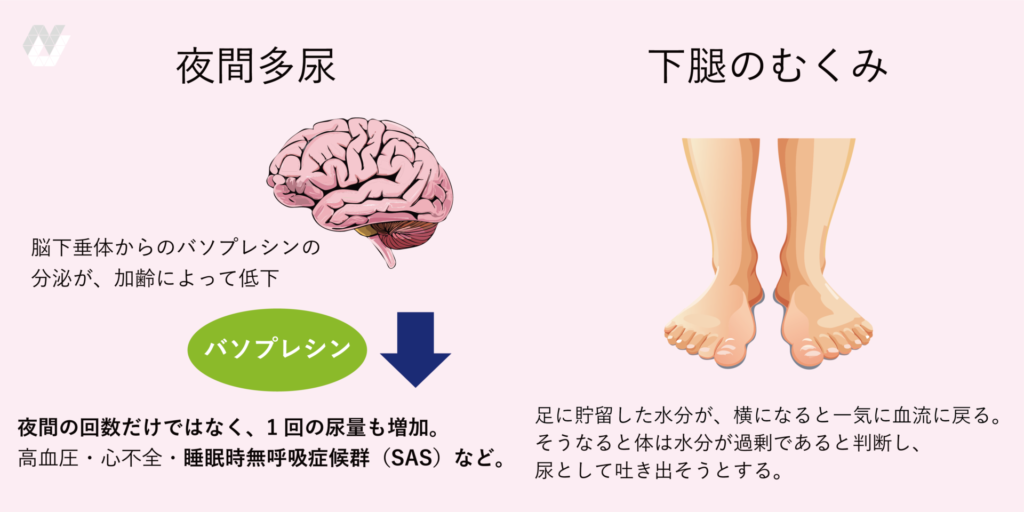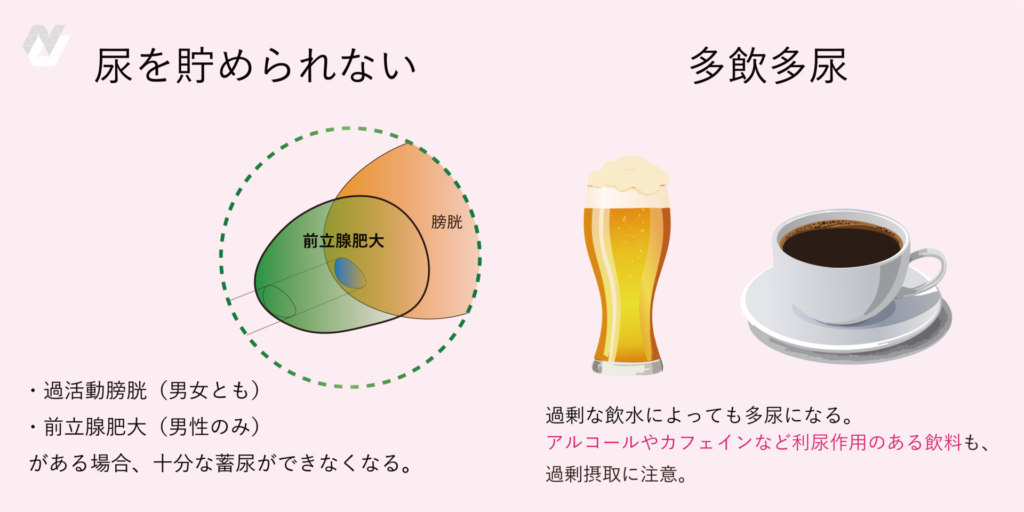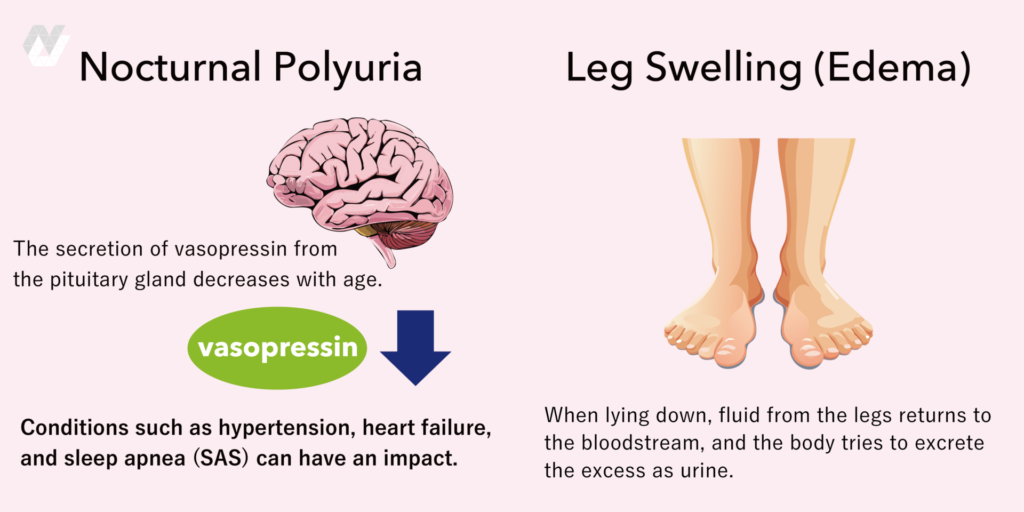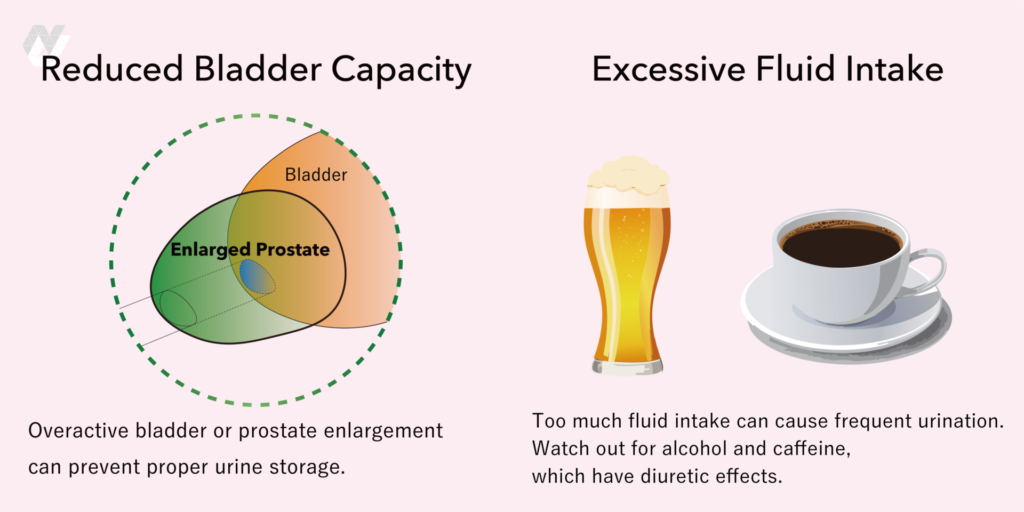
| 月 | 火 | 水 | 木 | 金 | 土 | 日/祝 | |
|---|---|---|---|---|---|---|---|
| 9:00~12:30 |
|
|
|
|
|
~13:00 |
|
| 14:00~17:00 |
|
|
|
|
|
|
|

Please scroll down for the explanation in English.
夜はぐっすり眠っていたいのに、トイレのために何度も起きてしまう。
そんな経験はありませんか?
「年齢のせいだから仕方ない」「起きてもすぐ眠れるから大丈夫」──
そう考えて我慢している方も多いかもしれません。
しかし、夜間頻尿は治療できる症状です。
◆ 夜間頻尿とは
医学的には「就寝後、排尿のために1回以上起きること」を夜間頻尿といいます。尿意で目が覚めてしまうと、再び眠りにつくのは難しくなります。特に夜2回以上起きるようになると、睡眠の質が低下し、日中の疲労や集中力の低下につながります。さらに高齢の方では、夜間の移動時に転倒や骨折のリスクも高まります。
◆ 原因
夜間頻尿は、以下のような複数の要因が絡み合って生じることが多いです。

1. 夜間多尿(夜間だけ尿量が増える)
本来日中に多く作られるはずの尿が、夜間に偏ってしまう状態です。加齢により抗利尿ホルモンの分泌が低下すると、昼夜の尿量が逆転することもあります。心不全や高血圧、睡眠時無呼吸症候群(SAS)などが背景にある場合も。とくにSASでは、無呼吸による酸素不足や胸腔内圧の低下が抗利尿ホルモン分泌を妨げ、夜間尿量増加の一因となります。
2. 下腿のむくみ(浮腫)
夕方に足がむくむ方は注意が必要です。就寝中、横になることで重力が解消され、下半身にたまった水分が血流に戻ることで、腎臓での夜間の尿産生が増えます。

3. 膀胱の容量が小さくなる
過活動膀胱や前立腺肥大症などが原因で、少しの尿貯留でもトイレに行きたくなる状態です。膀胱に十分に尿をためられないため、夜間も頻繁に目が覚めてしまいます。
4. 浅い睡眠
加齢によって眠りが浅くなり、わずかな膀胱の刺激でも目が覚めやすくなります。夜間頻尿のつもりが、実は不眠や睡眠障害が主因だったというケースも少なくありません。
5. 多飲多尿
一般的な運動量の場合、水分摂取量の目安は「体重×30〜35mL」です(食事からの水分も含む)。食事からは総水分の約30〜40%が摂取されるとされており、体重60kgの方の場合、飲み物からの水分摂取は1.2〜1.5L程度が適量と考えられます。医師から飲水を勧められている方も、過剰摂取が多尿の原因になっていないか見直すことが大切です。気になる方には、排尿日誌の記録をおすすめしています。
◆ 検査
- 尿検査:尿の混濁や血尿の有無を確認します
- 腹部エコー・残尿測定:前立腺や膀胱機能の評価に役立ちます
- 排尿日誌:夜間多尿や多飲多尿が疑われる際に有用です
- 採血:腎機能などを必要に応じて評価します
- 睡眠時無呼吸の検査:ご自宅でできる簡易検査も対応可能です(当院で手配できます)
◆ 治療
生活習慣の見直し
- 夕方以降の過剰な水分摂取を控える
- 塩分を控える
- 寝る前2~3時間のカフェイン・アルコールを避ける
- 足のむくみがある方は、夕方に足を高く上げて休む、着圧ソックスの使用も有効
薬物療法
- 夜間多尿タイプ:抗利尿ホルモン薬(デスモプレシン)を使用し、夜の尿量を減らす。ただし、この薬の保険適応は男性のみです。昼から夕方にかけて、少量の利尿剤を使用することもあります。
- 膀胱過敏タイプ:β3作動薬や抗コリン薬で膀胱の過剰な収縮を抑えます。
- 前立腺肥大が関与:α遮断薬・PDE5阻害薬・5α還元酵素阻害薬などで排尿の流れをスムーズに
その他
- 必要に応じて、睡眠時無呼吸症候群に対するCPAP療法も検討されます
◆ 最後に
睡眠の質は、生活の質に直結します。「夜トイレに起きるのは年齢のせい」と我慢せず、体からのサインとして受け止めてみてください。当院では、夜間頻尿の原因を一つひとつ丁寧に評価し、その方に合った治療方法をご提案しています。まずはお気軽にご相談ください。
この記事は、西川口泌尿器科クリニック院長 内田裕將(日本専門医機構認定 泌尿器科専門医)により執筆されています。
Do you often find yourself waking up multiple times at night to use the bathroom, even though you just want a good night’s sleep? Many people endure this, thinking, “It’s just part of getting older,” or “It’s fine because I fall back asleep quickly.”
However, nocturia is a treatable condition.
◆ What Is Nocturia?
Medically, nocturia refers to waking up one or more times during sleep to urinate. Once the urge to urinate wakes you, it can be difficult to fall back asleep. When this occurs two or more times per night, it can significantly reduce your sleep quality, leading to daytime fatigue and poor concentration. In older adults, it can also increase the risk of falls and fractures during nighttime trips to the bathroom.
◆ Common Causes
Nocturia is often the result of multiple overlapping factors, including:

1. Nocturnal Polyuria (Excessive Urine Production at Night)
Normally, the body produces more urine during the day and less at night. However, with aging, the secretion of antidiuretic hormone may decline, sometimes reversing this day-night balance.
Heart failure, high blood pressure, and sleep apnea syndrome (SAS) may also contribute. In particular, sleep apnea can suppress antidiuretic hormone due to low oxygen levels and changes in chest pressure, increasing nighttime urine output.
2. Leg Swelling (Edema)
If you experience leg swelling by the evening, it may be a factor. When you lie down, gravity is reduced and fluid accumulated in the lower body returns to circulation, prompting the kidneys to produce more urine at night.

3. Reduced Bladder Capacity
Conditions like overactive bladder or benign prostatic hyperplasia (BPH) can lead to frequent urination even with small amounts of stored urine. This makes it difficult to sleep through the night without waking up to urinate.
4. Shallow Sleep
With aging, sleep becomes lighter, and even mild bladder stimulation may wake you. In some cases, what appears to be nocturia may actually be caused by insomnia or other sleep disorders.
5. Excessive Fluid Intake
For individuals with an average level of physical activity, the recommended daily fluid intake is 30 to 35 mL per kilogram of body weight (including fluids from food). It is estimated that approximately 30–40% of total fluid intake comes from food. For someone weighing 60 kg, this means that about 1.2 to 1.5 liters of fluid from beverages per day is considered appropriate. Even for those who have been advised by their doctor to increase fluid intake, it’s important to review whether excessive drinking may be contributing to frequent urination. If you’re concerned, keeping a urination diary can be a helpful first step.
◆ Tests and Evaluations
- Urinalysis: Checks for signs of infection or blood in the urine
- Abdominal ultrasound and residual urine measurement: Useful for assessing the bladder and prostate
- Voiding diary: Especially useful for suspected nocturnal polyuria or excessive fluid intake
- Blood tests: Assess kidney function and other relevant factors
- Sleep apnea screening: We offer convenient at-home testing using a pulse oximeter and breathing sensor
◆ Treatment Options
● Lifestyle Adjustments
- Avoid excessive fluid intake in the evening
- Reduce salt intake
- Refrain from caffeine and alcohol 2–3 hours before bedtime
- If you have leg swelling, raise your legs in the evening or try compression socks
● Medication
- Nocturnal polyuria: Medications like desmopressin can reduce nighttime urine production (currently approved for use in men only). In some cases, a small dose of diuretic in the afternoon may be helpful.
- Overactive bladder: Medications such as β3 agonists or anticholinergics can help relax the bladder.
- Benign prostatic hyperplasia (BPH): Alpha blockers, PDE5 inhibitors, or 5-alpha-reductase inhibitors may improve urinary flow.
● Additional Therapies
- If sleep apnea is suspected, CPAP therapy may be considered.
◆ In Conclusion
Sleep quality directly impacts your quality of life. Waking up to use the bathroom at night may seem like a normal part of aging, but it could be your body’s way of telling you something. At our clinic, we carefully evaluate the underlying causes of nocturia and provide treatment plans tailored to each individual. Please don’t hesitate to reach out for a consultation.
This article was written by
Yusuke Uchida M.D., Ph.D.
Director, Nishikawaguchi Urology Clinic
Board-Certified Urologist (certified by the Japanese Medical Specialty Board)
